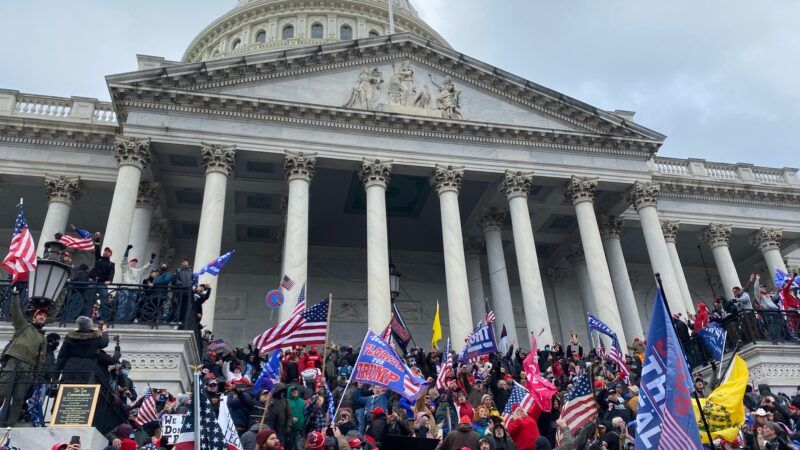The Confusion Surrounding Brian Sicknick's Death Was a Failure of Government Transparency
Blame the media for running anonymous sources, but don't let government off the hook for its secrecy and misinformation.

The Washington Post reported Monday, more than three months after the death of U.S. Capitol Police Officer Brian Sicknick following the January 6 Capitol riots, that Sicknick died of natural causes and did not have any external or internal injuries.
The findings of D.C.'s chief medical examiner end months of speculation surrounding Sicknick's death, and have led to questions about how the media could botch, yet again, such an important story.
For those who earn their bread complaining about the perfidy of the press, like Glenn Greenwald, this is just another instance of the hopelessly corrupt liberal media spinning a story to conform to its preferred narrative.
"This is what is so repulsive is they completely exploited this person, this young police officer, who they obviously didn't care anything about," Greenwald told Fox News host Tucker Carlson last night. "They saw him as a toy to exploit his death for purely political ends in ways that we now know were a complete and utter lie."
That's not the whole picture, though, or even a mildly accurate one. The medical examiner noted that "all that transpired played a role in [Sicknick's] condition."
In fact, the past few months are just as much a government transparency failure as a media failure. And placing the blame squarely on the media ignores law enforcement's long history of laundering misinformation when it suits its purposes.
It's not that reporters don't want the information. Fourteen news organizations are currently suing to unseal camera footage showing alleged assaults on Sicknick, which was played in the trial of one of the January 6 defendants.
Because the Capitol Police are under the legislative branch, the department is exempt from the federal Freedom of Information Act. You can't put in a public records request for an incident report or the other sort of records that most every other police department in the U.S. is required by law to disclose when asked.
Likewise, autopsy reports are confidential in the District of Columbia. In some other states, these medical examiner reports are invaluable tools for journalists to report and fact-check police narratives. News outlets and press freedom groups, for instance, went to court to force the disclosure of autopsy reports from the 2017 mass shooting in Las Vegas.
With the Capitol Police conspicuously mum after putting out an initial statement that Sicknick died "due to injuries sustained while on-duty," and with limited access to primary records, the public was left with yammering pundits, anonymously sourced stories that were impossible to confirm, and misinformation from the highest levels of government.
On January 8, the Associated Press reported: "During the struggle at the Capitol, Sicknick, 42, was hit in the head with a fire extinguisher, two law enforcement officials said. The officials could not discuss the ongoing investigation publicly and spoke to The Associated Press on condition of anonymity."
That same day, the Justice Department released a statement from acting Attorney General Jeffrey Rosen that said Sicknick "succumbed last night to the injuries he suffered defending the U.S. Capitol, against the violent mob who stormed it on January 6th." (The Justice Department did not immediately respond to a request for comment on why this erroneous information was released to the public.)
And here's how The New York Times reported on the confusion on January 15: "Law enforcement officials initially said Mr. Sicknick was struck with a fire extinguisher, but weeks later, police sources and investigators were at odds over whether he was hit. Medical experts have said he did not die of blunt force trauma, according to one law enforcement official."
In a vacuum of primary sources, bullshit will prevail. If you want faster, more accurate reporting, demand better public record laws and more transparency from officials.
